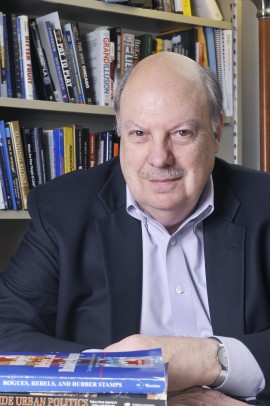City Council, aldermen showing stronger support for mayor, report finds
Mayor Rahm Emanuel has enjoyed stronger City Council support and less opposition from aldermen since April 2017 than in his previous six years, as well as less opposition than former Mayor Richard M. Daley faced in his final term, according to a new report by the UIC political science department.
The report, which marks the tenth in a series, assesses 19 months of aldermanic voting patterns and the support the mayor’s position received on divided roll call votes, which is when at least one or more aldermen vote against the mayor and his administration.
“Aldermanic support for Emanuel began to slip a little in the two years after he was re-elected in 2015,” said Dick Simpson, professor of political science and lead author of the report. “However, as our new report shows, the small slippage of support for Emanuel compared to Daley turned out to be short-lived.”
During the period from June 2015 to March 2017, only five aldermen voted with Emanuel 100 percent of the time and 22 voted with him 90 percent to 99 percent of the time.
These results are comparable to Daley’s last term, when seven aldermen voted for the mayor’s positions 100 percent of the time and 24 voted with the mayor between 90 percent to 99 percent of the time.
In contrast, the report shows Emanuel gained more support since April 2017 as 11 aldermen voted 100 percent of the time to back the mayor’s position and 32 council members voted with him 90 percent to 99 percent of the time.
The 11 aldermen who supported Mayor Emanuel’s positions on 100 percent of all votes from April 19, 2017, to Nov. 14, 2018, are: Leslie Harrison (5th Ward), Roderick Sawyer (6th Ward), Michelle Harris (8th Ward), Edward Burke (14th Ward), Howard Brookins (21st Ward), Daniel Solis (25th Ward), Walter Burnett Jr. (27th Ward), Chris Taliaferro (29th Ward), Carrie Austin (34th Ward), Emma Mitts (37th Ward), and Margaret Laurino (39th Ward).
“Clearly, the persistent rubber stamp council has returned with a vengeance,” Simpson said.
The council’s Progressive Caucus represents five of seven aldermen who voted with Emanuel less than 90 percent of the time: John Arena (45th Ward), Scott Waguespack (32nd Ward), Carlos Ramirez-Rosa (35th Ward) and David Moore (17th Ward.) The other two are Nicholas Sposato (38th Ward) and Anthony Napolitano (41st Ward).
One of the most divided debates highlighted in the report is the vote on an amendment to the municipal code that would have exempted aldermanic staff and independent contractors working for aldermen from reporting sources of income and conflicts of interest. It failed by a vote of 21-24.
Another hotly contested issue was Mayor Emanuel’s proposal to provide a $5.5 million TIF subsidy for Presence Health Network, the state’s largest Catholic health system, to build a corporate headquarters in downtown Chicago and to help build four community care centers in neighborhoods with limited medical services. The subsidy was approved by a vote of 31-18, which was the closest margin of victory on any of the mayor’s initiatives during his time in office.
With Chicago’s mayoral and aldermanic elections taking place Feb. 26, Simpson says the report provides citizens with useful information about their current alderman and how he or she voted on key issues.
“Although Chicago residents have become accustomed — through six decades with a few brief exceptions — to our mayors with iron-fisted control dominating city councils, Chicago voters now, in the next few months, face a number of big questions,” he said.
The report, “Chicago City Council and the Mayor: Big Questions on the Threshold to Change Chicago City Council Report #10,” is available online. Co-authors are Marco Rosaire Rossi, UIC Ph.D. student in political science, and Tom Gradel, a former political media consultant.

